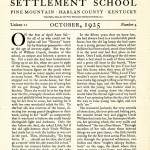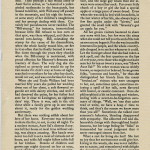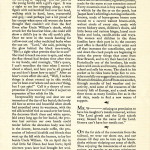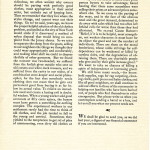Pine Mountain Settlement School
Series 17: PUBLICATIONS PMSS
NOTES 1925
October
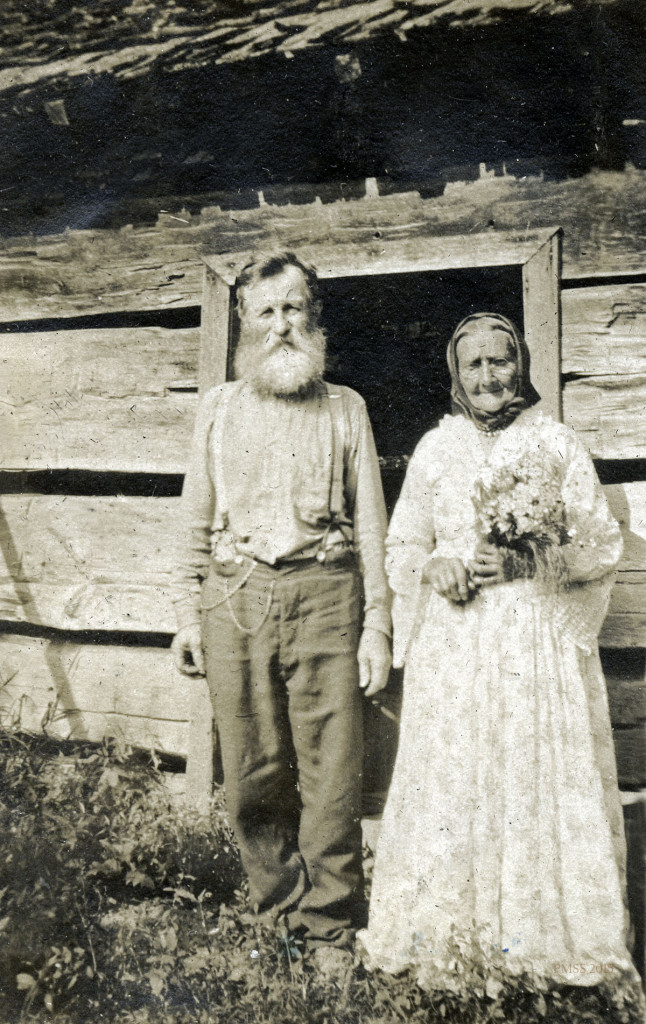
Uncle William and Aunt Sal Creech in re-enactment of their wedding of 50 years ago. [melv_II_album_081_mod.jpg]
NOTES – 1925
“Notes from the Pine Mountain Settlement School”
1925 October
GALLERY: NOTES – 1925 October
.”..[M]any [donated] things that are sent to us come simply as a relief to someone’s closet floor or bureau drawers, with no thought of our probable needs. We, who never wear silk stockings or party fixings, must wonder what to do with [them]….”
- Notes – 1925 October, page 1. [PMSS_notes_1925_oct_001.jpg]
- Notes – 1925 October, page 2. [PMSS_notes_1925_oct_002.jpg]
- Notes – 1925 October, page 3.[PMSS_notes_1925_oct_003.jpg]
- Notes – 1925 October, page 4.[PMSS_notes_1925_oct_004.jpg]
TAGS: NOTES – 1925 OCTOBER, death of Aunt Sal, Poor Fork, clinics, whittling, hearth brooms, craft, Bear Branch, William Creech, Jaspar Isom, Canon Barnett, clothing donations
TRANSCRIPTION: NOTES – 1925 October
P. 1
NOTES FROM THE
PINE MOUNTAIN
SETTLEMENT SCHOOL
PINE MOUNTAIN * HARLAN COUNTY * KENTUCKY
Copyright, 1925, by Pine Mountain Settlement School
Volume II OCTOBER, 1925 Number 4
ON the first of April Aunt Sal — for all of us who could not by rights call her “Granny” knew her by this dear possessive — died at the age of seventy-eight. She was the wife of William Creech, founder of this school, as unique and beloved a person as he. For a year she had been housebound. Going up to see her, when we came in sight of the house, we missed that staunch old. weather-beaten figure on the porch where she had peeled so many apples and strung so many beans. We knew she hadn’t even stepped out to the smoke-house, but that we must wait for the warm joy of seeing her till we got through the house into the kitchen. There she would be in her big chair near the fire, strangely shrunken with weakness and pitifully blind from cataracts, longing for her time to come, but waiting for it with her own wonderful relish for life. To the last she was mistress of the house, directing her young grand-daughters in their work, seeing to her “stuff” so competently that it was hard to believe she could barely distinguish light and darkness. Only the day before she died, she asked Little Sal if the old split-bottom chair Uncle William had made her to rock the babies in was out in the yard. Then, whimsically, “Go bring hit in. If . . . . should see hit thar, she’d just go a-runnin’ with hit, she wants hit so bad.” Scarcely ten minutes before her death she bade them wind the clock, as if she, who had never sat down to smoke her pipe and see a little peace and quiet with the old clock’s claims unminded, could hardly settle to her long rest until the last familiar duty of the evenings of fifty-five years was done.
In the fifteen years that we knew her, she had always lived in a comfortable plank house, but the old log house she had come to as a young pioneer mother, where all her children had been raised, stood close behind it in the yard and had first place in her heart. Once I said, thinking of the old room where a bed stood in each of three corners and a great old loom in the fourth, “How easy it would have been for you if you had had this house when they were all little!” Then came quick denial. “Why, Lord! They wouldn’t never have done no good! They was cracks big enough to fling a cat through, betwixt those logs, and the floor was allus wet with the young ‘uns trackin’ mud in, and the wind coming down the chimney would blow the thread right out of my hand when I sat spinning before the fire; but hit’s the way to raise young ‘uns right, and not spile ’em.”
She treasured jealously the very utensils of those days, the iron pots and baking pan, the wooden bread tray and piggins Uncle William had made her, her homespun blankets, her spinning wheel, the very quills and bobbins of “the rise of her bloom.” Through snatches of her talk about these beloved things we saw past times, the little family coming for the first time across Pine Mountain through the primeval wilderness, two babies and three “mighty skimpy feather-beds” on the nags; the shack where they were to create a new home, and where Sal couldn’t sleep until the door was put up between her and the wild animals; Sal working at her wheel that first summer, and not helping Uncle William clear the land or raise the crop because another baby was…
[1]
P. 2
…coming in the fall. “I’d set thar spinning, and every now and then I’d find my hands in my lap, and me a-studyin’ about Mammy, and scarce able to stand hit. Over on the Poor Fork where I was raised, anyways two or three people went past the house every week, but here there weren’t nary soul.” Then perhaps a tale would come of Aunt Sal in action, so “a-feared of a yaller-pieded rattlesnake in the bean-patch, but bound to kill hit, with Will away off yander in the mountain, and hit nigh the house,” or some story of her children’s naughtiness and her prompt dealing with them. Certainly her punishments never rankled. The “Bill-stump,” for instance, immortalized because little Bill refused to hoe corn at that spot, was there whipped, and there resumed corn-hoeing. Bill, mistaking the stump for the cause of his discomfiture, when the whole family teased him, set fire in it so often that he finally burned it away. But down through the years they chuckle when the Bill-stump is mentioned, with proud affection for Mammy’s firmness and mastery of them. The very dog she disciplined so severely and would tie up for two weeks if it didn’t stay at home at night, searched everywhere for her after her death, would not eat, and was comfortless for days. When she and Uncle William had been married fifty years she pulled her wedding dress out of her chest, a soft flowered organdie set with dainty stitches, and well it had deserved the pains, for her father had sent for it clear to Lexington, an eighteen days’ trip. There it was, safe in the old chest while a family grew up in one room about it, ready for the golden wedding anniversary.
But there was nothing selfish about her love of her home. Everyone was welcome to share the fire, to eat, to stay all night. To a modern woman, Aunt Sal’s distress if anyone left her house at meal time without eating, was always amazing. Her hands were never too full to set a meal of victuals out of hours, and table-full might follow table-full in her kitchen. Dozens of children and grown-ups might descend on her at once, grand-children, neighbors, or near acquaintances; she was never afraid, or at least she never showed it, that the little feet would trample her blossoms. At once everyone felt welcome and content, in such an atmosphere as few women can create. The children played all over the yard, and chased the chickens and turkeys in amiable companionship; the grown folks helped with the work or sat quiet as they chose. Aunt Sal was never hurried or put out. The babies must all be jounced on her knees, and all of them loved at first sight the brown wrinkled face, and the large gay beads that she always wore around her neck. For every little chunk of a boy or girl she had a special apple or a large piece of sweet-bread. Even when she was sick in bed with bronchitis, in the last winter of her life, she always kept a few fine apples under the “kivers,” and greeted the small folk with “Granny’s got an apple for you.”
All her grown visitors hastened to share any news with her, but few were the times when she could not tell you the end of the tale as soon as you began it. For she was incurably interested in people, and the whole countryside dropped in to see her whenever it could. Let the word get about that she had taken a sick spell, and the first question on the lips of everyone, even those who might not have seen her for ten or twenty years, was “How’s Aunt Sal?” No other woman was so widely known, so respected or beloved. So we grown folks, “common and homely,” for thus she distinguished her friends from the many “fotched-on” visitors who were strangers to her, sat, sometimes quiet, sometimes enjoying a spell of her talk, news flavored with humor, or caustic comment. Once she philosophized a bit on learning and wisdom, ending with a never-to-be-forgotten summary of things. “Well, we ‘uns that caint read or write, we have a heap o’ time to think, and that’s the reason we know more than you all!” Sometimes she talked over someone’s behavior, blending disapproval with sympathy. She abhorred evil and dishonorable doings with thoroughbred fastidiousness, but her large feeling for “folks” so transcended her moral judgment that it never estranged sinners from her.
What a zest for living she had! She lost no joy that her environment could give her. Living in the woods, she was never indifferent to nature, and remembered with delight the “sanging” expeditions of her younger days, when a group of kinsfolk and neighbors would camp out a week at a time while they dug ginseng. We could guess what a spirited, wilful, charming little baggage she was, when, still twinkling over her triumph, she told how…
[2]
P. 3
…her uncle who had charge of the young people “allus let her brile her b’ar meat when he wouldn’t ‘low no other young ‘uns — reckon he knowed I would anyway!” She knew in wild strawberry time on just what sunny slope berries would be thickest and largest, and when she was past seventy she would set off berrying or “sapping” (for the juice of the young birch) with a girl’s vigor. It was a sight to see her stepping along, a trim figure with red kerchief tied over her head, walking stick in hand, keen, resourceful and gay, and perhaps just a bit proud of her energy when some old women she knew thought they couldn’t stir from the fire! Even after Uncle William’s death, which struck her the heaviest blow, she could still show a child’s joy in the old earth’s gifts. Once we were in the woods hunting for yellow-root and other medicinal herbs when the sun set. “Lord,” she said, pointing to the glow behind the black tree-trunks, “Hit’s a sight what pretties thar be to see!” She tried to teach me once to spin, and when the flax thread had broken time after time in my hands, said musingly, “Hit’s quare, I can’t reecollect the time when I weren’t about a wheel, and here you’re all growed up and don’t know how to spin!” After an hour’s more effort she said, “Well, I reckon things is about evened up in this world; you’ve been ever’whars and seen ever’thing, but I can spin!” Call it a theory of compensation if you want to; I take it as just an expression of her relish for life.
Inexpressibly moving and dear are our memories of the day of her burial; the lovely old face so serene and beautiful when death had smoothed away its weariness, with the red silk kerchief tied as usual over her head, the decorous black dress and white apron, laid away long ago for her burial, the precious last services our own hands could render before the shrunken body was laid in the decent, home-made coffin, the procession of beloved kinsfolk and friends that went up the hill with the bearers, to lay her beside Uncle William. On an April day in 1846 little Sal Dixon had been born; April nineteen years later had brought her wedding morning, and on that exquisite sunny afternoon when we left her in the hillside graveyard, stricken and bereft, we yet rejoiced that another April had brought her a new beginning of more abundant life.
***
AT the head of Bear Branch a family industry has sprung up among three brothers, the only citizens in a community practically given over to making or trafficking in moonshine, who are resolved to earn their living in some other way. And it has all grown out of the gift of a carved walnut walking stick, which one of the brothers, a grateful patient, made for the nurse at our extension center! Every mountain man is boy enough to love to whittle by the fire or on the porch, but Jaspar Isom’s whittling is turning out hearth-brooms, made of home-grown broom corn wound to a carved walnut broom-stick, walnut stools of every size, made with woven hickory seats, children’s chairs, odd little boxes and curious hinges, laurel coat-hooks and locks, candle-sticks and trays. The women and children in the three families have their part in it; the country post office is thankful for every order sent off that increases the cancellation, and up and down the creek people are beginning to notice the pretty things that come from Bear Branch, and to try their hand at it too. Periodically one of the brothers, his mule laden with stools and brooms, rides into the school and sells his wares. The check in his pocket as he rides home helps him to consider carefully our suggestions and criticisms. Mountain firesides, shut off from one another, through months of bad weather and inactivity, need some of the resources of the country folk of Europe, and a creek where three times as many families live as in the old days, needs to find a new means of support.
***
MR. W——— refusing us permission to have his daughter’s tonsils removed, writes: “The Lord giveth and the Lord taketh away; blessed be the name of the Lord. Geneva can’t have her tonsils out.”
***
ON the far side of the mountain from the railroad, we wear our shoes out, and our dresses till they can be torn up for house-cloths without violating our sense of thrift. Thus enjoying the innocencies of an earlier society, we wonder as we open missionary boxes and barrels, and sort out their contents, if the delicately balanced social order on the other side of the mountain will sometime evolve as satisfactory a scheme as our own. Plainly, many things that are sent…
[3]
P. 4
…to us come simply as a relief to someone’s closet floor or bureau drawers, with no thought of our probable needs. We, who never wear silk stockings or party fixings, must decide what to do with charming silver dancing slippers, chiffon dresses, dress suits, stiff bosom shirts and outworn starched collars. Even when the problem is not so ridiculous, we often wonder why owners should be parting with perfectly good clothes, most appropriate in their social order, but entirely out of keeping here. Then we remember that they live where the styles change, and cannot wear out their things. Go to! we said, years ago, we know the proper helpful solution of the old clothes problem, and smiled as the city of New York would smile if it discovered a method of refuse disposal that would bring no complaint from the Jersey shores. So we tried to separate the sheep from the goats, selling to our neighbors the things we thought they could wear appropriately and comfortably, and making what shift we could to dispose thriftily of other garments. But we found the monster was two-headed; we suffered from the foolish giver outside who sent us old corsets and white duck trousers, and we suffered from the rarity in our midst, of a combination store-keeper and social philosopher; for the fact that somebody needs clothing does not mean that he gets any permanent good from buying it at far below its actual value. To relieve an immediate need and create a lasting evil is doubtful wisdom. When a young worker sold good overcoats at fifty cents apiece, the buyers must have gotten a something-for-nothing complex. The experienced workers in our settlement rarely had the time to think of old clothes, and the job tended to fall to the young and untried. Sometimes they yielded to the temptation to get rid of piles of uninteresting, even dirty old clothes at any price, or to stock up a large family of children quite visibly in need. Sometimes, in fairness we record it, they conducted sales wisely and helpfully so that the garments covering the outer man did no harm to the inner man’s self-respect. Almost invariably the saleswoman hated the scramble of it all, and the efforts of some more prosperous buyers to take advantage; hated hearing that these same scramblers were selling their prizes at advanced prices somewhere else. So we came to the parting of the ways, and in the face of the obvious need and the great demand, determined to do away with sales which had too often left behind evils far worse than those they had alleviated. We re-read Canon Barnett: “Relief, if it is to be helpful, must strength- en, not weaken character; it must have for its object the good and not the comfort of individuals. There are those on the moral borderland, whose noble strivings for self-dependence can be weakened or killed by careless doles, and the degradation of obtaining them. There are charitable people who give and by their gifts increase greed.” We want to take no chances of killing a spirit of independence or increasing greed.
We still have many needs, — for household supplies, rags for rag carpeting, cleaning cloths, quilt pieces and baby clothes; and like all good neighbors, we shall continue to add our efforts to those of the community in helping out families who have been burned out, or people who find themselves in other emergencies. But please write us when you contemplate sending a barrel or a box, and let us tell you what our present needs are.
***
WE shall be glad to send you, as we did last year, a digest of our financial statement if you are interested.
[4]
The Marchbanks Press, New York
Previous:
NOTES – 1924
Next:
NOTES – 1926
See Also:
SALLY DIXON CREECH Community – Biography
Return To:
NOTES Index

